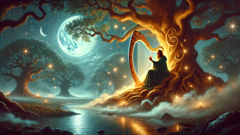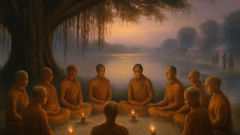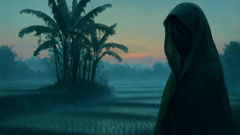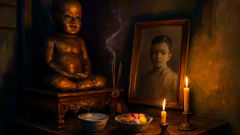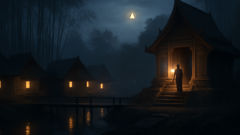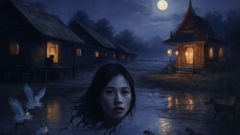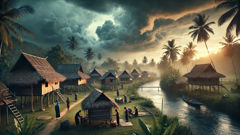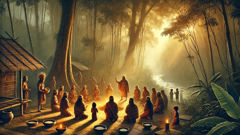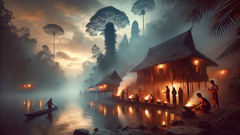Introduction
In the ancient heart of Ireland, when hills still whispered secrets to the wind and the rivers remembered the footsteps of gods, there lived a people whose stories shimmered like dew on emerald grass. The Tuatha Dé Danann, gifted with wisdom and mystery, ruled the land with magic as old as the stars. Among them stood the Dagda, chief and father, whose laughter could shake thunder from clouds and whose sorrows could quiet the world. Yet above all his treasures and feats, it was his harp—Uaithne—that sang the loudest in legend. Carved from the wood of a sacred oak, inlaid with runes no mortal hand could write, the harp was said to hold the music of Ireland itself. Its strings, spun from silver mist and golden sunbeams, echoed with three magics: Goltraí, the music of sorrow; Gentraí, the music of joy; and Suantraí, the music of sleep. The harp did not simply play tunes—it shaped the world’s feelings, wove peace through battlefields, and mended the aching hearts of gods and men. But such a treasure could never remain untouched by envy. In the shadowed forests and deep barrows, foes watched and coveted, knowing that the harp’s power could tip the balance of fate. And so, on a night when starlight quivered above the stone circles and the Dagda’s laughter faded with the sun, a darkness crept into Ireland. It was the beginning of a tale that would travel down centuries, passed by hearth and fire, echoing wherever longing and hope found a home. This is the legend of the Dagda’s Harp—the story of a magic that could break the hardest heart and heal the deepest wound, woven into the song of a land forever enchanted.
The Gift of Uaithne: Birth of the Harp
Long before men built towers of stone and drew boundaries on the green land, the world hummed with magic, and the Tuatha Dé Danann shaped Ireland with wisdom and song. The Dagda, high chief and guardian, watched over his people with a gaze that held both thunder and kindness. In his hands was power: a cauldron that never emptied, a club that could slay and heal, and, most precious of all, Uaithne—the harp of all harps, born not merely of wood and string but of the breath of creation itself. Legends say the harp was forged in the aftermath of a storm, when the sky cracked open and lightning kissed the roots of the oldest oak in Brí Léith. The Dagda found the oak fallen, its heartwood still warm from the thunder’s fire, and his spirit heard a yearning, ancient melody trapped in the grain. Guided by dreams and omens, he fashioned Uaithne by moonlight, tracing runes into its frame with a finger dipped in dew. The harp’s voice was a mystery—sometimes the laughter of rivers, sometimes the sigh of mourning winds. As dawn broke, the harp’s first note woke every bird in Ireland and stilled every sorrow for a breathless moment. It was said that those who heard it could never forget its song; it would haunt their dreams, gentle or fierce. The Dagda carried Uaithne into the gatherings of the gods. He played Goltraí at funerals and wakes, a music that drew tears from warriors who’d never wept. He played Gentraí at weddings and feasts, filling halls with joy so radiant it could mend feuds and sweeten even the sourest ale. And at the close of battles, when exhaustion and dread pressed like a shroud, he played Suantraí, weaving peace through shattered ranks and lulling wounded men to sleep. No enemy could touch the harp as long as the Dagda’s will guarded it. Yet stories grew in the shadowed corners—of Fomorians, dark spirits from across the sea, whose hunger for magic was bottomless. They whispered that if Uaithne ever left the Dagda’s hands, Ireland itself would grow silent. The harp’s fame spread beyond the green hills, reaching the ears of those who envied the Tuatha’s golden age. Every feast, every victory, every sorrow in Ireland found its echo in Uaithne’s strings, tying the land’s fate to the music only the Dagda could command.
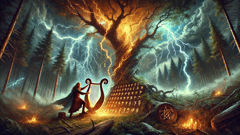
The Shadow Rises: Fomorian Envy
Beyond the western horizon, where the cold sea churned and mists tangled over black rocks, the Fomorians brooded in their fortress of glass and bone. They were creatures born of chaos and longing, twisted by bitterness at the beauty of the Tuatha Dé Danann. Balor of the Evil Eye, their king, had heard of Uaithne and coveted its magic—not for music or healing, but for dominion over Ireland’s spirit. Balor’s spies—shadows with no shape, whispers in the grass—brought him tales of the harp’s power. Each note the Dagda played seemed to ripple through the land, turning men from war to peace or waking hope where despair had rooted. The Fomorians understood that whoever held Uaithne would not just rule Ireland’s soil, but her dreams. In secret councils beneath green waves and haunted cairns, Balor wove a plan of theft and treachery. He summoned Bres, a half-Fomorian prince who once ruled the Tuatha with a cold heart, to lead the plot. Bres, ever resentful for his exile from the gods, agreed. On the eve of Samhain, when spirits wandered and veils thinned, the Fomorians crossed the land disguised as wind and mist. They slipped past watchful druids and through ancient circles, finding the Dagda at his camp, weary after a long feast. As he dozed, his harp glowing softly beside him, Bres crept forward. Using a net woven from seaweed and shadow, Bres snared Uaithne and vanished into the darkness. The Dagda woke to silence—a silence so deep it rang in his bones. All of Ireland seemed to pause. The birds stopped singing, and even rivers stilled their music. In that stillness, sorrow crept over him—not just for himself, but for every soul whose joys and griefs would now echo unanswered. The Tuatha gathered, rage and fear mingling in their eyes. Without the harp’s music, their unity faltered. The land itself seemed to fade, as if color and spirit drained from the hills. The Dagda vowed to reclaim Uaithne, knowing that to do so would test not just his might, but the wisdom he’d earned from sorrow, joy, and sleep.
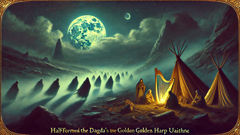
Journey of Loss: Sorrow Across the Land
The loss of Uaithne spread like a winter frost over Ireland. The Tuatha Dé Danann felt its absence in every breath—their feasts were hollow, their laughter brittle. Even nature mourned; flowers drooped, the winds lost their song, and animals grew restless. The Dagda, once the heart of every celebration, became a figure of quiet determination. He donned his cloak, gathered his club and cauldron, and set out to retrieve his harp, accompanied by his son Aengus Óg and the fierce goddess Mórrígan. Their path wound through haunted woods, ancient dolmens, and along rivers that murmured memories of happier days. At every village, the people came forward—some with offerings, others simply begging for the return of music. Children clung to their mothers, remembering only faint echoes of lullabies once played by the Dagda’s gentle hands. The journey was not just one of miles, but of sorrow’s weight. At night, as they camped beneath unfamiliar stars, the Dagda’s dreams were troubled. He saw Uaithne locked in shadowed halls, its strings weeping for release. He felt the sorrow of his people pressed into his bones, threatening to break his spirit. Yet each dawn brought some small sign of hope—a wildflower blooming out of season, a bird daring a tentative note. These fragile gifts reminded the Dagda that even in deepest grief, Ireland’s spirit endured. As they crossed bogs and climbed misty hills, they faced Fomorian tricks: illusions that twisted reality, storms conjured from spite, and whispers that sowed doubt. The Mórrígan fought off shadowy beasts, while Aengus Óg’s laughter kindled brief sparks of joy. Through hardship and fear, the Dagda’s love for his people grew stronger. He realized that Uaithne’s magic was not just in its strings—it was in the hearts that remembered its music, in the hope that survived even when the world felt lost. Each step brought them closer to the Fomorian stronghold, where Balor waited with his monstrous eye and Bres plotted vengeance. The Dagda prepared not just for battle, but for a test of spirit—one that would demand wisdom as much as strength.
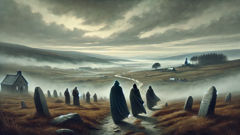
The Three Songs: Magic Unleashed
The Fomorians kept Uaithne in a fortress carved from salt-crusted stone, high above roaring waves. Balor reveled in his prize, commanding Bres to force the harp to play for the Fomorian court. But no matter how they struck or coaxed the strings, the harp refused to sing. Its silence became a torment—a constant reminder that true magic cannot be commanded by greed or fear. When the Dagda and his companions reached the fortress, they saw Fomorian guards slumped in uneasy sleep. The Mórrígan slipped into shadow, spreading confusion among their foes, while Aengus Óg distracted sentries with dreams of lost love. The Dagda entered the great hall alone. There, in a pool of cold light, stood Uaithne—silent, but humming with a power that grew as he approached. Balor, his eye blazing, mocked the Dagda and demanded he prove his worth. The Dagda did not answer with words. He set his hands to the harp and played Goltraí. The music of sorrow washed over the hall, deep and wild. Even the Fomorians felt tears slip down their cheeks; Balor’s monstrous eye closed in pain as old wounds ached anew. The world outside felt the song—fields turning silver with dew, rivers pausing as if to listen. Then the Dagda played Gentraí. The air sparkled; laughter broke out among even the most bitter-hearted. Memories of sunlight and feasts filled every corner. Old enemies clasped hands, forgetting hatred for a fleeting moment. Finally, he played Suantraí. The music wound through the fortress like a gentle breeze, settling over Fomorian warriors and gods alike. One by one they slumped into sleep, even Balor’s eye drooping shut. Only the Dagda stood awake, wrapped in the peace he had woven. He lifted Uaithne and slipped from the fortress, rejoining Aengus Óg and Mórrígan beneath a sky bright with dawn. The land itself seemed to wake—the grass greener, the air sweeter. With each step homeward, Ireland healed a little more.
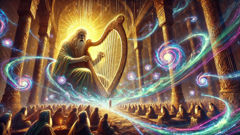
Return of the Harp: Ireland Restored
The journey back was a celebration, though the road remained long. As word spread that the Dagda had reclaimed Uaithne, villagers emerged from their homes to greet him. Children danced ahead, their faces bright with laughter; old men wept for joy at hearing familiar melodies drift through the valleys once more. At Tara, the seat of the Tuatha Dé Danann, a great feast awaited. Bards composed new verses in honor of Uaithne’s return, and druids wove tales of loss and hope around crackling fires. The Dagda played for all—first Goltraí, honoring sorrows past; then Gentraí, rekindling happiness; and finally Suantraí, granting rest to those who had suffered. The land responded in kind: fields blossomed with wildflowers overnight, rivers sparkled with newfound clarity, and birds filled the air with song. The harp’s magic echoed not only in music but in the gentle healing of wounds, the mending of broken friendships, and a renewed sense of unity among the Tuatha and their kin. Yet the Dagda never forgot the lessons learned in sorrow. He kept Uaithne close, knowing its magic was both a blessing and a burden. The harp’s power was not just in its ability to sway emotions but in its reminder that Ireland’s spirit was unbreakable—even in loss. Legends say that as long as someone remembers Uaithne’s song, hope will never fully fade from the land. The Dagda’s laughter rang out once more over green hills, mingling with the timeless music of his harp—a melody forever bound to Ireland’s heart.
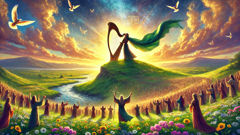
Conclusion
The legend of the Dagda’s Harp lingers in every corner of Ireland—in the music that drifts across misty hills, in stories told by firelight, and in hearts that find comfort through sorrow and joy alike. Uaithne’s melodies remind us that true magic lies not in might alone but in wisdom: to mourn what is lost, to celebrate what endures, and to offer peace where wounds are deep. In an age of heroes and monsters, it was not just strength that saved a land but the power to heal, to forgive, and to hope again. The Dagda’s tale is a promise that every heartbroken silence can become a song, and that even when darkness falls, someone will remember how to coax music from sorrow. So long as stories are told and harps are played beneath ancient oaks, the spirit of Uaithne—and of Ireland itself—will never fade.

